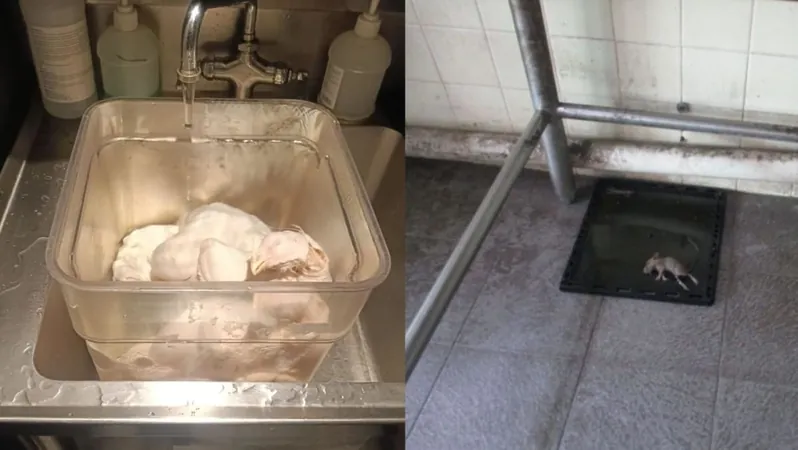
Food Safety Under Siege: Why Singapore's Catering Industry Faces Crisis Amid Staffing Woes
2024-11-15
Author: Yu
SINGAPORE: A surge in food poisoning incidents has highlighted a troubling trend within Singapore's catering sector: a significant manpower shortage is contributing to dangerous lapses in food safety practices.
Experts and industry professionals have pointed to this staffing crisis as a critical factor that is undermining public health amidst soaring demand for catering services.
Demand Vs. Supply: The Growing Gap
With catering orders spiking up to 10% in the last two years as consumers return to post-pandemic norms, the number of catering firms has stagnated, leaving existing businesses struggling to cope during peak seasons such as the upcoming Christmas holidays.
The Association of Catering Professionals Singapore (ACAPS) reports that while demand for catering has surged, the number of new entrants to the market has seen little to no growth in the past three to four years.
The Impact of Inadequate Staffing
Food safety expert Jesse Tan warns that inadequate staffing leads to shortcuts in food preparation and cooking processes, increasing the chance of human error.
“When you have a shortage of manpower,” he explains, “basic safety protocols, like proper cooking times for food items, can fall through the cracks.” This negligence could result in foodborne illnesses due to undercooked meals, contamination, or improper handling of ingredients.
Recent Outbreaks and Their Implications
Recent months have witnessed alarming food poisoning outbreaks, with numerous cases linked to catered events.
One incident at ByteDance's office caused 130 individuals to fall ill, while another outbreak involved 51 cases of gastroenteritis from Stamford Catering Services. Notably, prestigious dining establishments like Peach Garden and the Edge buffet at Pan Pacific Hotel also faced scrutiny due to similar incidents.
Government Response
In response to these growing concerns, the Singaporean government has introduced legislative measures that could impose stricter penalties on violators of food safety regulations.
But the underlying issues remain, as those who are employed end up taking on additional responsibilities when their colleagues are unavailable, increasing the risk of making critical mistakes.
Increased Demand for Audits
Tan's consultancy firm has seen a 30% increase this year in requests for kitchen audits as more companies seek to bolster their food safety protocols, adopting the approach that 'prevention is always better than cure.'
Many businesses now prefer surprise inspections to identify unnoticed weaknesses in their practices.
The Role of the Singapore Food Agency
The Singapore Food Agency is also intensifying its oversight, employing data analytics to identify establishments with troubling histories related to food safety.
Inspections target areas such as pest control, the separation of raw and cooked foods, and overall sanitation of facilities.
TECHNOLOGY: A GAME-CHANGER IN CATERING SAFETY
One innovative catering company, Rasel Catering, has taken proactive steps to enhance food safety by hiring 8% more staff during high-demand seasons and investing around S$200,000 (approximately US$148,800) in advanced technology.
This includes ozone generators that disinfect the air by eliminating harmful bacteria, as well as sensors to monitor air quality and temperature, ensuring they remain within safe levels.
Rigorous Testing Procedures
Moreover, the company is committed to rigorous testing procedures, conducting microbiological assessments and surprise checks to enforce hygiene standards among kitchen staff.
INCREASED TRAINING FOR FOOD HANDLERS
In light of these incidents, more catering companies and restaurants are sending their food handlers for comprehensive training.
The consultancy firm ISRC has reported a rise in participation in its food safety courses, which cover essential topics such as personal hygiene and the implementation of food safety management systems.
The Urgency of Addressing Food Safety
"High-profile food poisoning cases have created newfound urgency," noted ISRC consultant Chan Fong Ying.
Many establishments are now adopting recognized certifications to satisfy client demands and enhance their operational integrity.
Conclusion
As Singapore faces these alarming challenges in food safety, it is clear that both innovation and education will be vital in safeguarding public health and restoring confidence in the catering industry.

 Brasil (PT)
Brasil (PT)
 Canada (EN)
Canada (EN)
 Chile (ES)
Chile (ES)
 España (ES)
España (ES)
 France (FR)
France (FR)
 Hong Kong (EN)
Hong Kong (EN)
 Italia (IT)
Italia (IT)
 日本 (JA)
日本 (JA)
 Magyarország (HU)
Magyarország (HU)
 Norge (NO)
Norge (NO)
 Polska (PL)
Polska (PL)
 Schweiz (DE)
Schweiz (DE)
 Singapore (EN)
Singapore (EN)
 Sverige (SV)
Sverige (SV)
 Suomi (FI)
Suomi (FI)
 Türkiye (TR)
Türkiye (TR)